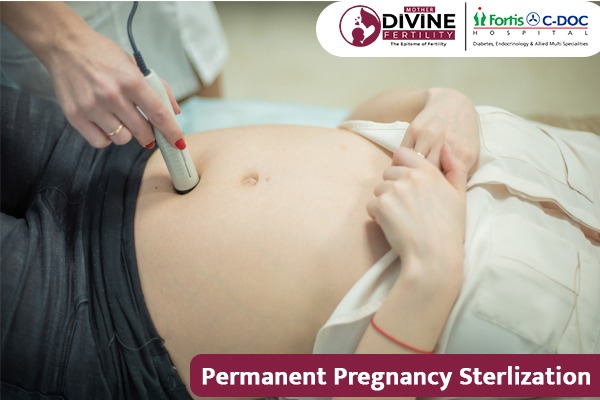

Permanent Pregnancy Sterilization in Delhi
The concept of permanent pregnancy sterilization has become a critical aspect of family planning and reproductive health in modern society. For couples and individuals who have decided not to have children or have completed their desired family size, permanent sterilization offers a reliable and long-term contraceptive solution. Mother Divine Fertility Centre in Delhi is one of the leading institutions in India providing comprehensive services for permanent pregnancy sterilization in Delhi. The details of permanent pregnancy sterilization procedures offered at the center, their benefits, potential risks, and the importance of informed decision-making in family planning.
Understanding Permanent Pregnancy Sterilization
Definition and Purpose:
Permanent pregnancy sterilization, also known as tubal ligation or female sterilization, is a surgical procedure that involves closing or blocking a woman's fallopian tubes to prevent eggs from reaching the uterus and sperm from reaching the eggs. As a result, fertilization is prevented, making pregnancy unlikely or nearly impossible.
Types of Permanent Sterilization:
Mother Divine Fertility Centre offers various methods of permanent pregnancy sterilization:
a) Laparoscopic Tubal Ligation: A minimally invasive procedure where small incisions are made in the abdomen to insert a laparoscope and special instruments to close or block the fallopian tubes.
b) Hysteroscopic Tubal Occlusion: A non-surgical procedure where a small device is placed in the fallopian tubes through the cervix to create a barrier, blocking the tubes.
c) Postpartum Tubal Ligation: A surgical procedure performed after childbirth, either through an abdominal incision or during a cesarean section.
d) Mini-Laparotomy: A slightly larger incision is made near the navel to access and close the fallopian tubes.
The Process at Mother Divine Fertility Centre
Initial Consultation and Counseling:
Patients interested in permanent pregnancy sterilization undergo an initial consultation with a gynecologist or a family planning specialist. The healthcare professional discusses the different sterilization options, explains the procedure, and helps the patient make an informed decision based on their medical history and family planning goals. It is crucial to ensure that the individual or couple fully understands the permanence of the procedure before proceeding.
Pre-operative Preparation:
Before the sterilization procedure, patients will receive instructions on pre-operative preparations, which may include fasting for a specific period and discontinuing certain medications that can interfere with the surgery. A comprehensive medical evaluation is conducted to ensure that the patient is fit for the procedure.
Sterilization Procedure:
Depending on the chosen method, the sterilization procedure is performed either as a minimally invasive laparoscopic or hysteroscopic procedure or as a postpartum tubal ligation during a cesarean section. For the laparoscopic approach, general anesthesia is administered, while local anesthesia is used for hysteroscopic tubal occlusion.
Benefits of Permanent Pregnancy Sterilization
Highly Effective Contraception:
Permanent pregnancy sterilization is one of the most effective forms of contraception available, with a success rate of over 99%.
Long-Term Convenience:
Once the procedure is completed, there is no need for daily contraceptive measures, providing convenience and peace of mind.
Irreversible Contraception:
For individuals and couples who are certain about not wanting more children, permanent sterilization offers an irreversible solution.
Lower Risk of Ectopic Pregnancy:
By preventing fertilization, the risk of ectopic pregnancies, which can be life-threatening, is significantly reduced.
Risks and Considerations
Irreversibility:
The decision to undergo permanent pregnancy sterilization should be made carefully, as the procedure is considered irreversible. While some sterilization procedures can be reversed through surgical techniques like tubal reversal, success is not guaranteed.
Surgical Risks:
As with any surgical procedure, there are inherent risks involved, such as infection, bleeding, or adverse reactions to anesthesia.
Counseling and Informed Consent:
Mother Divine Fertility Centre emphasizes the importance of thorough counseling and obtaining informed consent from patients. Patients are encouraged to discuss their feelings, concerns, and long-term family planning goals during the counseling process.
Conclusion:
Permanent pregnancy sterilization is a significant decision that requires careful consideration and comprehensive counseling. Mother Divine Fertility Centre in Delhi offers various safe and effective methods of permanent sterilization, ensuring that patients make informed choices aligned with their family planning needs. By understanding the benefits and potential risks associated with the procedure, individuals and couples can confidently embrace this long-term contraception option, leading to a fulfilling and healthy reproductive journey.





